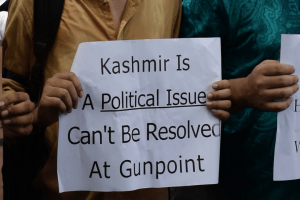Newspaper Article 19/08/2016
The issue of Kashmir dates back to partition. At the time of partition, 80 percent of the area’s population was Muslim and the people were willing to join Pakistan. However, against the population’s wishes, the Hindu ruler of Kashmir acceded the valley to India. Since then the Kashmiri people are fighting for their right. Over these years, the Kashmiris have suffered and sacrificed a lot. As per ‘Article 370’ of the Indian constitution, Kashmir has a special status. Despite the killings and sufferings, the people of Kashmir have not given up their right of self-determination. Indian coercive approach has failed against the Kashmiris determination. Recently, Burhan Wani, a young Kashmiri activist was killed by the Indian Army. Wani through the social media tried to promote the Kashmir freedom struggle.
The use of force against unarmed civilians is inhumane. So far, nearly 50 people, mainly the youth, have been killed and over 3,000 injured, many with incapacitating injuries. The firing of pellets is a violation of international humanitarian law (reference Fourth Geneva Convention). More than 100 youth and children have lost their vision permanently as the Indian para-military forces fire pellet guns directly aiming at their faces to cause maximum damage.
“The Indian Home Minister, Rajnath Singh has accused Pakistan of being responsible for the all the trouble in Kashmir, stating in Rajya Sabha that the neighbouring country was responsible for what was happening in Jammu and Kashmir.” The projection of Kashmiri freedom struggle as a terrorist drive (atankwadi) is part of a campaign to justify the killings in the IHK by the Indian security forces. Indian External Affairs Minister Sushma Swaraj said “Pakistan is perpetrating terror activities through ‘Jamaatud Dawa founder’ Hafiz Saeed and other terrorists in an area which is an integral part of India.” Kashmir struggle is not a separatist/secessionist movement, rather, it is an indigenous struggle. The unrest, in the aftermath of Wani’s martyrdom speaks of the valour of the Kashmiri youth against the Indian forceful occupation. Kashmir is once again telling India to leave. The anti-India sentiment has reinforced. It is the strongest now. To curb the freedom struggle, India has adopted a coercive posture. The blatant use of state force against the protestors including youth, children and women, jamming internet, social media, cell phones and debarring newspapers portrays the Indian aggressive posture.
The Kashmiris living in Pakistan, Europe and other parts of the world can feel the pain of their fellow brothers. In the prevalent era of IT, through the media/social networking sites people can convey their opinion to a large audience. Burhan Wani is being viewed as an icon of Kashmir struggle. A number of young Kashmiris, settled abroad have changed their Facebook profile picture to Wani’s photo. The international community cannot sit idle and watch the Kashmiri people suffer. It appears that human rights have taken a backseat to political and economic concerns and there are few countries willing to speak out on behalf of the long-suffering Kashmiris.
Kashmir is an internationally recognized disputed territory under the UN Security Council resolutions. Kashmir, one of the loveliest places on earth is being destroyed by ruthless terrorism of Indian Security Forces. The Kashmiri people need to be empowered so that their victimization at the hands of India comes to an end. The international community must call on the Indian government to honour its human rights obligations and peaceful settlement of Kashmir issue, in accordance with the UN Security Council resolutions. To counter the Indian moves on Kashmir issue, there is a need for a meaningful/enhanced advocacy efforts for the cause of Kashmir in the international arena. The right of self-determination under the UN auspices is the right of the Kashmiri people. The plebiscite option as defined under the UN Security Council resolutions needs to be enforced.
[A version of this article appeared in Pakistan Observer dated 6 August and Daily Times dated 9 August 2016]
Disclaimer: Views expressed are of the writer and are not necessary reflective of IPRI policy.

